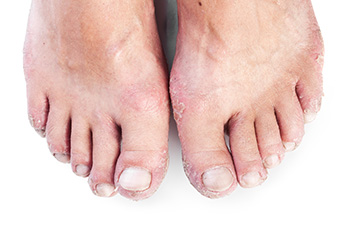Ways Psoriasis Affects the Feet
Tuesday, 19 December 2023 00:00
Psoriasis is a chronic autoimmune skin condition known for its distinctive red, scaly patches that commonly appear on various parts of the body. Unfortunately, psoriasis can also affect the feet, causing discomfort and complications. When psoriasis targets the feet, it can lead to symptoms such as redness, scaling, itching, and pain. The skin on the soles, toenails, and even between the toes can be affected. Psoriatic lesions on the feet can make walking and wearing shoes painful, significantly impacting one's quality of life. Moreover, psoriasis-related nail changes can lead to pitting, thickening, or even detachment of the toenails. Proper foot care and management strategies, such as topical treatments and lifestyle adjustments, can help alleviate the symptoms and improve the overall health of your feet. If you suspect psoriasis is affecting your feet, it is suggested that you schedule an appointment with a podiatrist who can provide you with an accurate diagnosis and personalized treatment plan.
When dealing with systemic disease of the feet, it is extremely important to check the affected areas routinely so that any additional problems are caught quickly. If you have any concerns about your feet and ankles contact Dr. Steven Schwartz from Pennsylvania. Our doctor will assist you with all of your podiatric needs.
Systemic Diseases of the Feet
Systemic diseases affect the whole body, and symptoms usually are displayed in the feet. This condition can make a patient’s ability to walk unbearable. Systemic diseases include gout, diabetes mellitus, neurological disorders, and arthritis.
Gout – is caused by an excess of uric acid in the body. Common symptoms include pain, inflammation, and redness at the metatarsal/phalangeal joint of the base big toe. Gout can be treated by NSAIDs to relieve pain and inflammation, and other drugs that lower the acid levels in the body.
Diabetes mellitus – is an increase in the level of blood sugar that the body cannot counteract with its own insulin. Failure to produce enough insulin is a factor in Diabetes.
Diabetes of the Feet
Diabetic Neuropathy – may lead to damaged nerves and affect the feet through numbness and loss of sensation.
Peripheral Vascular Disease – can restrict the blood flow to the feet, and often times lead to amputation of the feet.
If you have any questions please feel free to contact our offices located in Chambersburg, and Mcconnellsburg, PA . We offer the newest diagnostic and treatment technologies for all your foot and ankle needs.

